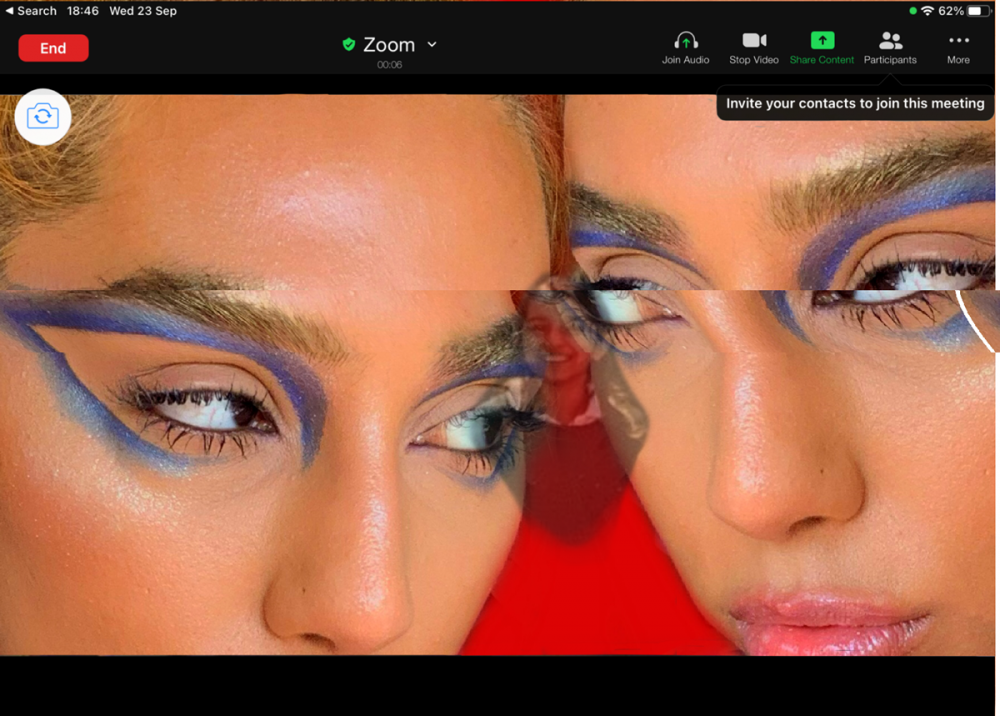
Umber Ghauri is a makeup artist, creative, stylist, writer, and public speaker. With a passion for celebrating marginalised identities, Umber began their journey with an Art History degree from The Courtauld Institute of Art, quickly moving onto a makeup training course. Combining an understanding of historical and current representation within art and media, Umber realised the role of makeup artist was one of great responsibility where LGBTQ people, disabled people and PoC are underserved. Umber believes that we should all experience our beauty in a positive environment, where we have control over how we look and how we are treated. Umber has experience in makeup for theatre, film, photography, performance, and events.
Clients include Patrisse Cullors, Mykki Blanco, Munroe Bergdorf, Rachael Young, Malik Nasad Sharpe, Sophie Duker, Levi’s, Queer Britain, The United Nations, Kuchenga Shenje, Alok Vaid Menon, Dean Atta, Travis Alabanza, Katy Jalili, Tate Britain, Victoria and Albert Museum, Lush Cosmetics, Revolution Beauty, British Film Institute and more.
Umber Ghauri
“Taken from Oscar Wilde’s ‘The Picture of Dorian Gray’ I want to focus on Sibyl Vane’s character. She is presented as an actress on stage and the main protagonist Dorian, falls in love with her performance and her beauty. He proclaims his love for her and proposes. She now experiences love personally not performatively. When Sibyl takes to the stage thereafter her performance lacked passion and subsequently Dorian rejects her and she commits suicide. ‘The girl never really lived, and so she has never really died. To you at least she was always a dream, a phantom’.
I wanted to draw this reference in to express how gender minorities seem to only exist (in the Victorian era as well as now) in the patriarchal gaze, as characters, images, and one-dimensional beings. And it follows that when a ‘girl’ does not fit the narrative forced upon them, they seem to combust the patriarchal mindset.
Screens and digital images are the ‘New Normal’ way to consume gender minorities and to form relationships with them, while Sibyl’s medium was the stage. But the distance, curated nature of the presentation, and subsequent flattening remains the same. The ‘new’ part of this normal is the constant interference. These interferences are defined by me as cosmetic alterations like injectables, notifications, ringing phones and beeps that punctuate and penetrate our experiences of each other, and heighten anxiety and alertness. We are constantly trying to spot what is ‘real’ or ‘fake’ through a screen, and we use this assessment to decide if a ‘girl’ is a ‘real’ or ‘fake’ human being.
The spectrum of Rape Culture is expressed in the way patriarchy views cosmetic vs non cosmetic medical interventions. I have had many medical interventions which have often felt like non consensual alterations to my body, and these are normalised. Consensual interventions like injectables, cosmetic surgery, tattoos, etc are judged by patriarchy much in the same way as consensual sex. This harks back to the Victorian philosophy of women’s sexuality whereby sexual pleasure is taboo, and suffering through sex for the sake of one’s ‘duty’ is respectable.
I had my fifth surgery on 17th March 2020, so my new normal body and new normal society under lockdown began at once. My virtual world which I had used long before became normal for others, as they too had to live like disabled people. The access needs of disabled people have been somewhat normalised by this pandemic, and therefore the fake and ableist narrative spun before has fallen to pieces. Reality is falling to pieces.
The resurgence of the Black Lives Matter movement was received by white organisations as a chance to tokenise and publicise, and further their anti-black agendas while posing as pro- black. My school photo from my first private school where I am the student with the darkest skin shows the kind of ‘diversity and inclusion’ that the world has falsely designed.
In 2020, the same kind of ‘Person of Colour’ is duplicated to make a group appear ‘diverse’ such as Priti Patel and Rishi Sunak. These groups still work towards white supremacist and genocidal goals. In this photo I am brown against my will, I wished I was white, but I look like some kind of symbol of progressiveness on the surface.
I am duplicated until I am every face, except one white girl. This ‘girl’ is my childhood best friend who died by suicide. I would argue that she was not allowed to ‘really live’.” Umber Ghauri